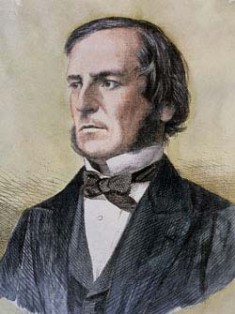| George Boole | |
|---|---|
 |
|
| Mathematician | |
| Specialty | Logic, philosophy of mathematics |
| Born | Nov. 2, 1815 Lincoln, Lincolnshire, England |
| Died | Dec. 8, 1864 (at age 49) Ballintemple, County Cork, Ireland |
| Nationality | British |
George Boole was an English mathematician, logician, and philosopher. He worked in the fields of differential equations and algebraic logic. He is best known for his book Laws of Thought and for being the inventor of Boolean logic, which later formed the basis of modern digital computer, George is regarded as the founder of the field of computer science.
Early Life
George was born on November 2, 1815 in Lincoln, England. His parents were Mary Joyce and John Boole. John made shoes, but he was very much interested in science and especially the application of mathematics to scientific instruments. The Boole family was not well off and part of the reason was due to John’s love of science and mathematics. This meant that he never devoted all his energy in the family business to create enough money.
After nine years of marriage, the couple had George, their first child. George Boole was christened the very day he was born. Apart from this, he was a very weak child and his parents feared he might not survive childhood. Over the next five years, Mary and John had three more children. Before long, George became a strong and healthy young boy.
Educational Years
George attended school in Lincoln during a short time of his early educational years. After one year, he went to a commercial school run by his dad’s friend. He remained in this school until he turned seven. George first learned about mathematics from his dad who gave him a strong liking for the constructing optical instruments. After turning seven, George attended a primary school where he grew an interest in languages.
George learned Latin, but then he went on to teach himself Greek. By the time he turned 14, he had became very skilled in Greek that he could speak fluently. He even translated a poem by the Greek poet Meleager. His dad was very proud of him and he published this poem. By this time, George was attending Brainbridge’s Commercial Academy where he had enrolled in September of 1828. Although the school could not provide the type of education he wished for, he was forced to stay since this was what his parents could afford.
George never studied for an academic degree. At only 16, he became an assistant schoolteacher at Heigham’s School in Doncaster. He maintained his interests in languages, but he later shifted his interest to mathematics. During this time, George was making notes that would later form the basis for the first mathematics paper.
Career Highlights
In 1833, Boole moved to a new teaching position in Liverpool. He remained there for the six months before going to Hall’s Academy in Waddington. In 1834, he started his own school in Lincoln at the age of 19 years old. In 1838, George, his parents and his siblings moved to Waddington to run the school together. Soon after, he opened a boarding school in Lincoln and again the entire family moved with him.
Contributions to Mathematics
In 1842, George Boole started corresponding with De Morgan, one of his most prominent supports. After one year, he wrote a paper on general method of analysis. He did this by applying different algebraic methods to solve differential equations which he sent to De Morgan for comments. The paper was published in 1844. For this great work, he was awarded the Society’s Royal Medal in 1844. By this time, his great mathematical work was starting to bring him a lot of fame.
In 1849, Boole was appointed chair of mathematics at Queens College in Cork. He soon became the first Professor of Mathematics at the College in Cork. He taught there for the remaining part of his career and gained a great reputation as a respected and dedicated teacher.
In 1854, Boole published a book – An Investigation of the Laws of Thought. In this book, he approached logic in new way and thereby reduced it to simple algebra which incorporated logic into mathematics. George also pointed out an analogy between the algebraic symbols and the ones representing logical forms. This started algebra of logic known as Boolean algebra.
George also worked on various equations. He published about 50 papers during the course of his career. He was also the first person to investigate basic properties of different numbers.
Death and Legacy
Throughout his life, George received many honors for his genius work. He received different honorary degrees from universities of Oxford and Dublin and was even elected Fellow of Royal Society in 1857. There is a crater on the moon named after him as well. George Boole died on December 8, 1864, at the age of 49.